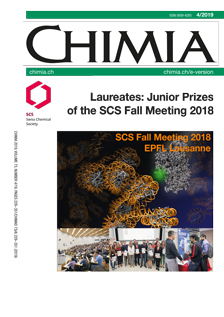Ruthenium Complexes with PYA Pincer Ligands for Catalytic Transfer Hydrogenation of Challenging Substrates
DOI:
https://doi.org/10.2533/chimia.2019.299PMID:
30975260Keywords:
Homogenous catalysis, Ligand design, Pyridylidene amides, Transfer hydrogenationAbstract
Here we highlight the potential of a series of ruthenium complexes with tridentate N,N,N pincer-type ligands featuring two pyridylidene amide (PYA) moieties in the ligand skeleton. They were successfully applied in transfer hydrogenation of ketones and C=C double bonds. Rational ligand design was key for increasing the catalytic performance in the reduction of challenging substrates such as potentially chelating acetylpyridines. The specific reaction profiles indicate catalyst poisoning via imine coordination as well as N,O-bidentate coordination of the substrate or the product. Approaches to mitigate this inhibition are presented. Furthermore, these PYA pincer ruthenium complexes accomplish the selective reduction of the C=C over C=O bond of α,β-unsaturated ketones such as benzylideneacetone, while other α,β-unsaturated ketones such as trans-chalcone predominantly underwent oxidative C=C bond cleavage.
Downloads
Published
Issue
Section
License
Copyright (c) 2019 Swiss Chemical Society

This work is licensed under a Creative Commons Attribution-NonCommercial 4.0 International License.







